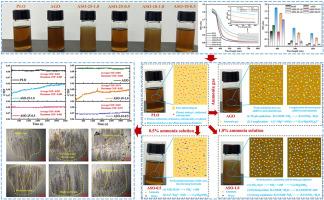船用氨发动机润滑油演化的机理:从分子相互作用到宏观性能
IF 8.3
2区 工程技术
Q1 CHEMISTRY, PHYSICAL
引用次数: 0
摘要
以氨为动力的船舶已成为一个关键方向。然而,氨是碱性的,会降低发动机油的性能,但没有明确的演化机制。为此,对船用氨发动机润滑油环境进行了模拟,并进行了长期试验和分子动力学研究。分析了各种润滑油的分散稳定性、流变性能、热重特性和抗磨性能。此外,还测定了油的红外光谱、核磁共振光谱和原子发射光谱。结果表明,氨对船用润滑油的性能有一定的影响。具体来说,氨气在添加物的作用下发生了轻微的氨化和络合。高质量分数的氨溶液与添加剂发生酰胺化和水解反应,OH-离子与钙、镁形成沉淀。值得注意的是,在低质量分数的氨溶液中,OH-离子与金属添加剂的反应占主导地位。这些研究结果为氨燃料在船用发动机上的应用提供了数据支持。本文章由计算机程序翻译,如有差异,请以英文原文为准。

Mechanistic insights into evolution of lubricating oil in marine ammonia engines: from molecular interactions to macroscopic performance
Ammonia-powered ships have emerged as a critical direction. However, ammonia being alkaline, can degrade engine oil performance without explicit evolution mechanisms. Hence, the environment of the lubricating oil in marine ammonia engines was simulated, and long-term tests and molecular dynamics were conducted. The dispersion stability, rheological properties, thermogravimetric characteristics, and anti-wear properties of various lubricating oils were analyzed. Additionally, the infrared, nuclear magnetic resonance, and atomic emission spectra of oils were examined. The results indicated that ammonia impaired the performance of the marine lubricating oil. Specifically, ammonia gas underwent mild amidation and complexation with additives. Ammonia solution with high mass fraction reacted via amidation and hydrolysis with additives, while OH- ions formed precipitates with calcium and magnesium. Notably, reactions of OH- ions with metal additives were dominant with a low-mass fraction of ammonia solution. These findings provide data support for the application of ammonia fuel in marine engines.
求助全文
通过发布文献求助,成功后即可免费获取论文全文。
去求助
来源期刊

International Journal of Hydrogen Energy
工程技术-环境科学
CiteScore
13.50
自引率
25.00%
发文量
3502
审稿时长
60 days
期刊介绍:
The objective of the International Journal of Hydrogen Energy is to facilitate the exchange of new ideas, technological advancements, and research findings in the field of Hydrogen Energy among scientists and engineers worldwide. This journal showcases original research, both analytical and experimental, covering various aspects of Hydrogen Energy. These include production, storage, transmission, utilization, enabling technologies, environmental impact, economic considerations, and global perspectives on hydrogen and its carriers such as NH3, CH4, alcohols, etc.
The utilization aspect encompasses various methods such as thermochemical (combustion), photochemical, electrochemical (fuel cells), and nuclear conversion of hydrogen, hydrogen isotopes, and hydrogen carriers into thermal, mechanical, and electrical energies. The applications of these energies can be found in transportation (including aerospace), industrial, commercial, and residential sectors.
 求助内容:
求助内容: 应助结果提醒方式:
应助结果提醒方式:


